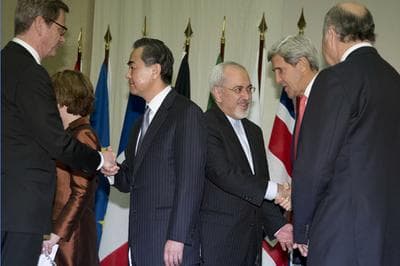Advertisement
'Historic' Deal Reached In Iranian Nuclear Talks
ResumeAn historic nuclear deal reached with Iran. There are vast implications. Huge potential implications and a huge range of reaction. We'll track it all.

A huge range of reaction today to the big new interim deal with Iran on sanctions and its nuclear program. From Israel, condemnation of a “historic mistake” as Benjamin Netanyahu put it. At the other end of the spectrum, talk of a “Nixon goes to China” historic breakthrough for the region by the Obama administration. A reordering that could break decades of US-Iran hostility and reshape the Middle East. In between, big questions on strategy, sincerity, nuclear verifiability, and domestic politics all over. This hour On Point: a deal with Iran, and where it goes.
-- Tom Ashbrook
Guests
David Ignatius, Washington Post columnist covering foreign affairs. Author of "Bloodmoney." (@IgnatiusPost)
Mehrzad Boroujerdi, director of the Middle East Studies Program at Syracuse University, president of the International Society of Iranian Studies.
Emily Landau, senior research fellow at Israel’s Institute for National Security Studies, director of the INSS' Arms Control and Regional Security Project. Author of "Arms Control in the Middle East: Cooperative Security Dialogue and Regional Constraints"
From Tom's Reading List
Wall Street Journal: Major Powers Reach Deal With Iran To Freeze Nuclear Program --"Iran will gain relief from Western economic sanctions that U.S. officials believe will provide between $6 billion and $7 billion in badly needed foreign exchange for Tehran over the next half-year. The agreement reached in Geneva is an interim deal for about six months that will allow international powers to try to strike a permanent pact, an effort experts said would be the true test of Iran's new government, headed by revitalization-minded President Hasan Rouhani."
Washington Post: Backstage brawl over a deal -- "As the Iran deal has taken shape, a backstage brawl is developing with Israel and Saudi Arabia, two countries crucially affected by the deal. The unrelenting attacks on the agreement by Israeli Prime Minister Benjamin Netanyahu, which are the culmination of four years of mistrust between him and President Obama, are rumbling the bedrock of the U.S.-Israeli relationship — a consequence neither country wants."
The Economist: Modest, but still historic --"The deal struck this weekend is not yet even the beginning of the end of the danger to the world posed by the possible (actually probable) military dimensions of Iran’s nuclear activities. It is a modest first step and there is still an awful lot that could go wrong: in particular, there are irreconcilables on all sides who might prefer that it did. Nor can Iran ever be fully defanged unless and until its leaders believe that it is in their best interests for that to happen—and that is still a long way off. But compared with the situation just a few months ago, what happened in Geneva is extraordinary and does properly deserve to be described as 'historic.'"
This program aired on November 25, 2013.